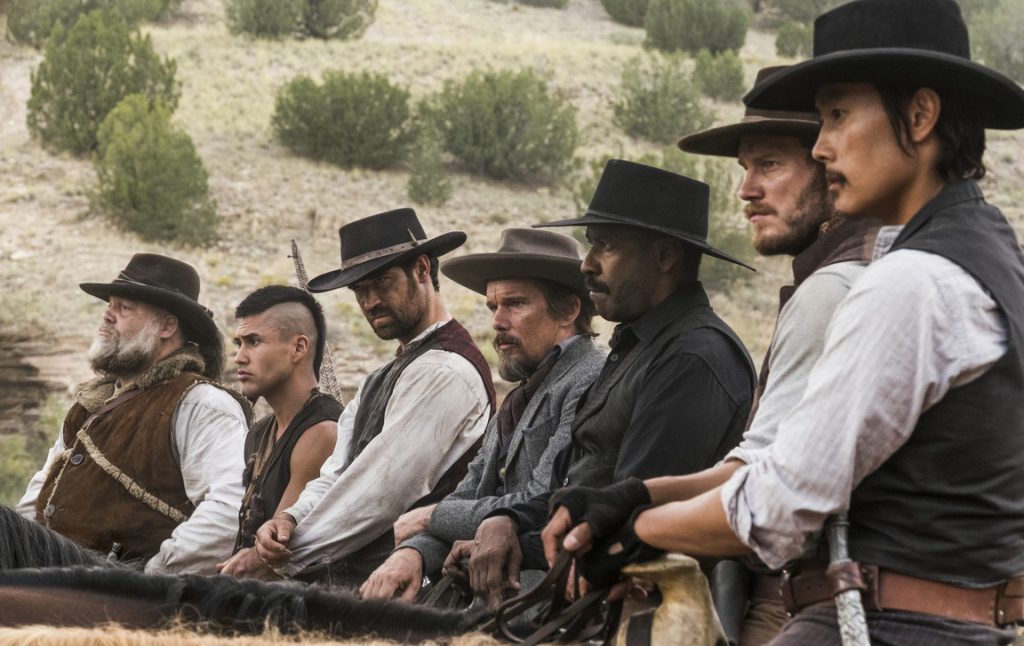The Magnificent Seven
Directed by: Antoine Fuqua
Starring: Denzel Washington, Chris Pratt, Haley Bennett, Ethan Hawke, Vincent D’Onofrio, Byung-hun Lee, Manuel Garcia-Rulfo, Martin Sensmeier, Peter Sarsgaard
Rated: PG-13 for extended and intense sequences of Western violence, and for historical smoking, some language and suggestive material
“The Seven Samurai” is hands-down one of the best samurai movies ever made. When John Sturges helmed “The Magnificent Seven,” a remake of it as a Western back in 1960, he created one of the best Western movies ever made. Antoin Fuqua and his cast work hard to make the remake-of-the-remake as superlative as its predecessors, but the pieces don’t quite come together enough. It’s good, but it left me wanting to watch the other two rather than to rewatch the new one. This is a good movie, but nowhere near as good as it wants to be.
The general story is the same: a small town is being terrorized by bad guys, and turns to a lawman for help. He gathers up six compatriots, and the seven of them do their best to defend the town against an all-out assault by the bad guys. Some people live and some people die, and it’s a sprawling and character-driven tale.
It’s hard to go too far wrong with that if you’re a decent filmmaker, and Fuqua is better than decent. The performances range from good to spectacular, the pacing builds speed and momentum gradually and well, and the gunfights are thrilling. Denzel Washington is pretty much flawless as the lawman who rounds up and leads the other heroes. He has the kind of gravitas necessary to make a Black lawman in the late 1800s believable, and between his skills and the solid writing, he carries the movie when necessary. His costars don’t leave it up to him, though.
Chris Pratt has beautiful comedic timing (as anybody who has seen his work on “Parks & Recreation” or “Guardians of the Galaxy” already knows), and he seems to be having a great time as the gambling, hard-drinking gunslinger Fuqua handed him. Vincent D’Onofrio pulls off another of his disappearing acts into a character – between the size of his character, the huge beard, and the odd voice he affects, he is almost unrecognizable if you don’t already know it’s him. Meanwhile, Peter Sarsgaard chews some scenery as the villainous Bart Bogue. It feels like a good chunk of his performance wound up on the cutting room floor, here’s hoping we get some deleted scenes on the DVD/Blu-ray release.
Where the film gets uneven is in its attempts to be subtle or invite interpretation. For example: the racial mix of the titular heroes is more diverse than in the original. However, the town is full of white folks rather than the poor Mexican farmers of the original, and there’s a lot of racist banter which goes unchallenged by the characters or the film itself. The woman who sets out to hire the heroes and does quite a bit of fighting herself appears to be a good-faith effort in the direction of feminism, but in a crucial moment she has to be rescued and she turns away, too afraid to watch the battle in her defense.
That said, these are not glaring flaws, especially not to anybody who just wants to see some gunfighting, some beautiful scenery, and some classic Western movie dialog. “The Magnificent Seven” may not be as good as it wants to be, but it’s still good. If you’re looking for a more modern version of the classic dramatic Western, it will suit just fine.
